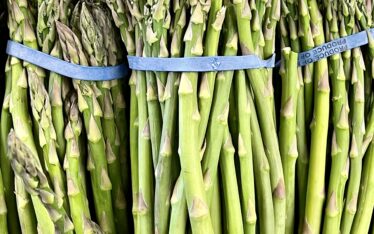 The robins have returned, the daffodils are flaunting their yellow and the first of the “short sleeve shirt days” has arrived here in the northeast… Happy spring! Spring is the season of renewal when we become inspired by the rebirth of nature around and within us. More light, life, color and warmth lift our spirits out of the winter doldrums.
The robins have returned, the daffodils are flaunting their yellow and the first of the “short sleeve shirt days” has arrived here in the northeast… Happy spring! Spring is the season of renewal when we become inspired by the rebirth of nature around and within us. More light, life, color and warmth lift our spirits out of the winter doldrums.
If you were to drive through the Amish Country in Lancaster PA this time of year you’d see beautiful quilts hanging on the lines and rugs draped over porch railings but spring cleaning is not just about your house or apartment. It also applies to your body, mind and spirit.
Many religious traditions use fasting to help people internalize their values and connect to their spirituality. Later this month Jews will celebrate Passover, eliminating bread and other leavened foods for eight days. Changing what you eat helps you appreciate your “usual” food more. It also enables you to identify how certain foods affect you.
Cleansing is more about what you don’t eat than what you do and it can be quite a natural process at this time of year. With warmer temperatures we begin to crave lighter foods and the myriad seasonal greens offer a perfect antidote to heavy winter foods. As we eat lighter and get outside to exercise more our bodies start to let go of those extra pounds we accumulated over the winter.
Cleansing assists the body with detoxification, one of our normal and vital functions. Some people cleanse by drinking only juices or other cleansing “formulas” for a few days to a week while others simply eliminate sugar, caffeine, flour, red meat etc. for some period of time.
Good, gentle cleanses include fresh fruits, plenty of lightly cooked vegetables and some healthy fats, whole grains and light proteins. We can give our bodies extra support during this time by taking some basic vitamin and antioxidant supplements, using herbs that support the liver, getting enough fiber and promoting sweating through exercise or other means that support the skin, an important part of our detoxification system.
Eating seasonal whole foods reduces stress on your body and helps your digestive system to cleanse naturally. Generally it is not appropriate for people who are very thin or nutritionally deficient to do a more restrictive cleanse and fasting should not be done without medical supervision.
Cleansing often brings up emotions and spending some introspective time dealing with these feelings as they come up is part of the process. Having support or being able to ask for support is an important component to a successful cleanse. Reducing our intake of food gives our digestive system a chance to rest and it often provides clarity that isn’t available to us when we are feeling “stuck” in our old eating habits/lifestyle patterns. Breaking those patterns can propel us toward more permanent changes that will improve our health for the long run.
Food Focus: Whole Grains
 Whole grains are packed with fiber, iron, vitamin and mineral complexes and amino acids. Since whole, unprocessed grains are absorbed slowly by the body they provide us with a steady source of energy.
Whole grains are packed with fiber, iron, vitamin and mineral complexes and amino acids. Since whole, unprocessed grains are absorbed slowly by the body they provide us with a steady source of energy.
Digestion of whole grains begins in the mouth through chewing and exposure to enzymes in our saliva. It is very important to chew whole grains thoroughly to maximize your assimilation of vital nutrients.
Most Americans eat a lot of wheat, the staple grain in our culture. Although whole, unprocessed wheat berries are a nutritional powerhouse; this is not the form of wheat we most often consume. Wheat is processed to make refined flours that have to be enriched because the naturally occurring nutrients and fiber are stripped away in processing. This type of wheat is ubiquitous today. Try taking a break from it for a while and pay attention to how you feel. You may also notice changes when you reintroduce wheat to your diet—this is the best way to learn about food sensitivities.
Overexposure to one food substance can cause food sensitivities and many people find they feel better when they reduce their consumption of wheat. Even if wheat is well tolerated there are many other wonderful whole grains to experiment with. Each of the whole grains has a different nutritional profile; by consuming a greater variety of whole grains we are giving our diet a nutrient boost.
The Ayurvedic tradition of India, a model for seasonal eating, suggests reducing your consumption of wheat and rice in the spring and favoring barley, rye, buckwheat, corn, and millet instead. These grains are “lighter” and easier to digest. Barley and rye are glutinous grains so people who have Celiac Disease or who cannot tolerate gluten should avoid them. Buckwheat, corn and millet do not contain gluten.
Cooked whole grains are a wonderful breakfast option and they make delicious pilafs when mixed with vegetables and/or beans. Cooked millet can be used in place of some of the flour in muffins, mixed with veggies and ground nuts to make a homemade veggie burger, or mixed with cooked cauliflower for a nutritious alternative to mashed potatoes. Use whole cornmeal to make polenta or as an alternative to bread crumbs as a coating for fish. There are many ways to introduce a new whole grain into your diet. Try out the barley recipe below or peruse one of the whole foods recipe sites on our resource page for ideas on preparing whole grain dishes that will delight your taste buds.
Recipe of the Month
 Barley and Wild Rice Pilaf with Sautéed Mushrooms
Barley and Wild Rice Pilaf with Sautéed Mushrooms
(Adapted from Fresh & Fast by Marie Simmons)
1 cup chopped onion
2 garlic cloves, crushed through a press
1 TB extra virgin olive oil
1/2 cup pearled barley
1/2 cup wild rice
2 cups water
2 cups organic free range beef or chicken broth
Salt, to taste
Mushrooms:
2 TB extra virgin olive oil
10 oz. white button mushrooms, trimmed and sliced
3 1/2 oz. shiitake mushrooms, stems discarded, caps sliced
1/4 cup packed fresh Italian leaf parsley
1 tsp. fresh thyme leaves, stripped from the stem or 1/4 tsp. dried
1 garlic clove, chopped
sea salt and freshly ground pepper
Directions:
1. Combine the onion, garlic and oil in a large, wide saucepan. Cook, stirring, over low heat until the onion is tender, about 5 minutes. Add the barley, wild rice, water, broth and salt. Bring to a boil; stir. Cover and cook over medium heat until the liquid is absorbed and the gains are tender, 50 to 60 minutes. Uncover and cook off any excess liquid.
2. Meanwhile, make the mushrooms: heat the oil in a large skillet. Add the mushrooms and cook, stirring, over medium-high heat until browned, about 10 minutes. Finely chop the parsley, thyme and garlic together. Add to the mushrooms; cook for one minute. Season to taste with salt and pepper.
3. Toss the mushrooms with the grains. Transfer to a serving dish. Serves 6.
Note: This dish can be made without the mushrooms if a simpler side dish is desired. The grains themselves have a nutty flavor and cooking them in the broth provides just enough interest.









Recent Comments